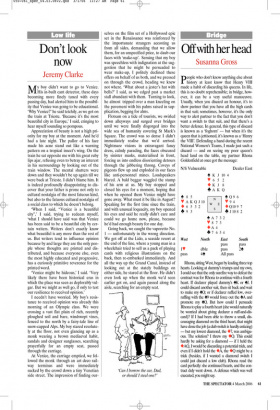Don’t look now
Jeremy Clarke
My boy didn’t want to go to Venice. His in-built cant detector, these days becoming more finely tuned with every passing day, had alerted him to the possibility that Venice was going to be educational. ‘Why Venice?’ he said tetchily, as we got on the train at Trieste. ‘Because it’s the most beautiful city in Europe,’ I said, cringing to hear myself sounding so pompous.
Appreciation of beauty is not a high priority for my boy at the moment. And he’d had a late night. The pallor of his face made his acne stand out like a warning pattern on a tropical insect’s wing. On the train he sat opposite me with his great ruby lips ajar, refusing even to betray an interest in his surroundings by looking out of the train window. The mental shutters were down and they wouldn’t be up again till we were back at Trieste. I didn’t blame him. It is indeed profoundly disappointing to discover that your father is prone not only to cultural nostalgia of the most fatuous kind, but also to the fatuous cultural nostalgia of a social class to which he doesn’t belong.
‘When I said, “Venice is a beautiful city”,’ I said, trying to redeem myself, ‘what I should have said was that Venice has been said to be a beautiful city by certain writers. Writers don’t exactly know what beautiful is any more than the rest of us. But writers tend to influence opinion because by and large they are the only people whose thoughts are printed and distributed, and because everyone else, even the most highly educated and progressive, has a curiously primitive reverence for the printed word.
‘Venice might be hideous,’ I said. ‘Very likely there have been historical eras in which the place was seen as deplorably vulgar. But we might as well go, if only to test our resilience to received opinion.’ I needn’t have worried. My boy’s resistance to received opinion was already this morning of an Olympic class. We were crossing a vast flat plain of rich, recently ploughed soil and bare, windswept vines, fenced to the north by a fairy-tale line of snow-capped Alps. My boy stared resolutely at the floor, not even glancing up as a monk wearing a brown mediaeval habit, sandals and designer sunglasses, searching prayerfully for an empty seat, passed through the carriage.
At Venice, the carriage emptied, we followed the monk through an art deco railway terminus and were immediately sucked by the crowd down a tiny Venetian side street. The impression of finding our selves on the film set of a Hollywood epic set in the Renaissance was reinforced by the importunate strangers accosting us from all sides, demanding that we allow them, for an unspecified price, to daub our faces with ‘make-up’. Sensing that my boy was speechless with indignation at the suggestion that he might be persuaded to wear make-up, I politely declined these offers on behalf of us both, and we pressed on through the crowd, heading we knew not where. ‘What about a jester’s hat with bells?’ I said, as we edged past a market stall abundant with them. Turning to look, he almost tripped over a man kneeling on the pavement with his palms raised in supplication, begging for alms.
Flotsam on a tide of tourists, we swirled down alleyways and surged over bridges until we were finally disgorged into the wide sea of humanity covering St Mark’s Square. The crowd was so dense I didn’t immediately realise that we’d arrived. Nightmare visions in extravagant fancy dress, calmly parading, the faces obscured by sinister masks, materialised in front, forcing us into endless disorienting detours through the jabbering throng. Coveys of pigeons flew up and exploded in our faces like anti-personnel mines. Loudspeakers blared. A bald beggar waggled the stump of his arm at us. My boy stopped and closed his eyes for a moment, hoping that when he opened them Venice might have gone away. What must it be like in August? Speaking for the first time since the train, and with unusual loquacity, my boy opened his eyes and said he really didn’t care and could we go home now, please, because he’d had enough beauty for one day.
Going back, we caught the vaporetto No. 1 — unfortunately in the wrong direction. We got off at the Lido, a seaside resort at the end of the line, where a young man in a wheelchair tried to sell us a pack of playing cards with religious illustrations on the back, then re-embarked immediately. And all the way up the Grand Canal, instead of looking out at the stately buildings on either side, he stared at the floor. He didn’t even look up when the monk we’d seen earlier got on, and again passed along the aisle, searching for an empty seat.










































































 Previous page
Previous page